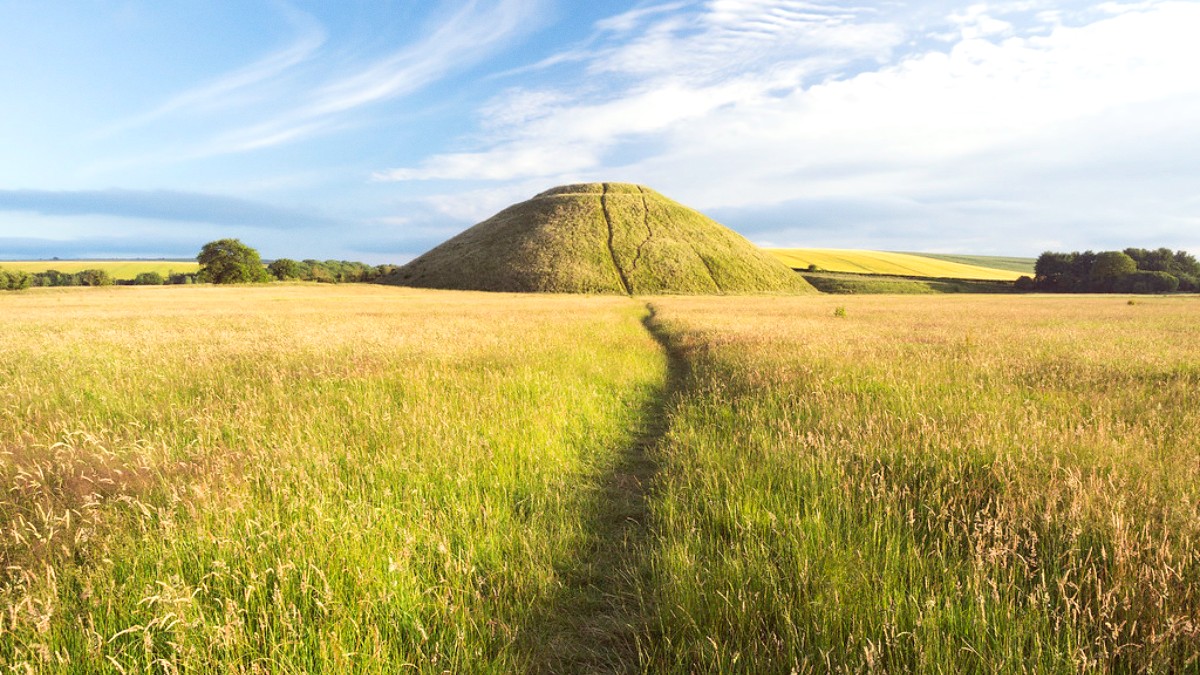
Southwest England, England
Wiltshire has a temperate maritime climate, with mild temperatures, moderate rainfall throughout the year, and limited extremes. This means you can visit at any time, but each season offers a different atmosphere.
Spring (March - May): Temperatures 3°C to 15°C (37°F to 59°F). Moderate rainfall. Humidity generally moderate. This period has a refreshing feel, with longer daylight hours than winter.
Summer (June - August): Temperatures 11°C to 22°C (52°F to 72°F), sometimes higher. Driest and sunniest period, though rain showers are common. Humidity remains moderate. Days are long.
Autumn (September - November): Temperatures 5°C to 16°C (41°F to 61°F). Rainfall rises, days shorten. Humidity moderate to high, leading to misty mornings. Landscape shows beautiful autumnal colors.
Winter (December - February): Temperatures 1°C to 8°C (34°F to 46°F). Wettest and coldest period, with occasional frost and rare snowfall. Humidity high. Daylight hours are shortest.
Outdoor Exploration (Hiking, Cycling, Gardens): Late Spring (May) and Summer (June-August) present the best weather. Gardens are most beautiful in May and June.
Visiting Stonehenge & Avebury: Shoulder seasons (April-May, September-October) are ideal for fewer crowds, or early mornings/late evenings in summer for a more tranquil experience and good light. Early morning or late evening in any season shows soft, appealing light. Winter has atmospheric misty scenes.
If you seek to avoid crowds at popular sites like Stonehenge, plan your visit for a weekday in the shoulder season, or aim for the first hour of opening or the last hour before closing, even in summer.
Visit popular sites early or late in the day.
More serene experience and better photo opportunities.
May require early mornings or late evenings.
Good weather, fewer people, lower prices.
Balanced travel experience with comfortable conditions.
Weather can be less predictable than in summer.
Quiet visits, unique photographic chances.
Peaceful exploration without crowds.
Cold, wet weather and shorter daylight hours.
Requirements vary by nationality and visit purpose. Always consult the official UK government website for current information.
UK Standard Visitor Visa: For most non-EEA and non-Swiss citizens for tourism, family visits, business, or short study (up to 6 months). The visa typically allows stays up to 6 months. Application starts online via the UK government's website. You then schedule an appointment at a visa application center in your home country to submit biometric data (fingerprints and photo) and documents. Apply well in advance.
Citizens of the EU, EEA countries, Switzerland, USA, Canada, Australia, New Zealand, Japan, South Korea, and many others do not need a visa for short tourist stays (up to 6 months). A complete list is on the UK government's official website. These visitors generally enter under the "Standard Visitor" route without a formal visa application.
Must be valid for your entire stay. Some airlines/countries may need more validity (e.g., three or six months beyond departure).
If needed, present a valid UK visa (stamped or electronic confirmation).
Show financial support for your stay (bank statements, pay slips, support letter).
Hotel bookings, rental confirmations, or invitation letters.
Evidence of your intent to leave the UK at the end of your visit.
Plan your expenses for a smooth Wiltshire trip.
The official currency is the Great British Pound (GBP, £). Exchange major foreign currencies at airports, banks, or bureaux de change. Often, withdrawing local currency directly from ATMs (cash machines/cashpoints) is more cost-effective. ATMs are widely available. Inform your bank of your travel plans. Credit and debit cards are widely accepted. Contactless payment is common.
Daily expenses vary based on travel style.
Free Attractions: Explore free sites like Avebury Stone Circle, walking trails, and local churches. Salisbury Cathedral accepts suggested donations.
Early Bird Deals: Book train tickets in advance ("Advance" tickets) for better savings. These tickets are often non-flexible but offer the best value.
Wiltshire is a safe destination, but knowing healthcare access and potential risks supports preparedness.
No specific vaccinations are for UK entry from most countries. Your routine vaccinations, as advised by your home country's health guidelines (e.g., MMR, Tetanus), should be current. Consult your doctor for personalized advice.
Common health concerns: Common cold/flu (practice hand hygiene), allergies (hay fever prevalent in spring/summer, carry antihistamines), sunburn/dehydration (use Sunscreen with a high SPF, stay hydrated), tick bites (check after hiking, consider Insect repellent), insect bites (midges in damp areas, use repellent).
Tap water in Wiltshire and throughout the UK is safe to drink unless specifically advised otherwise. Food hygiene standards are generally very high across the country. Choose reputable eateries and practice standard food safety.
Tap water is potable.
No water purification needed.
Wiltshire has a relatively low crime rate and is a very safe county for tourists. Violent crime is rare. Petty crime (e.g., pickpocketing, bag snatching) can occur in crowded tourist areas or city centers, especially around public transport hubs.
Generally safe for travelers.
Be aware of surroundings in crowded areas; secure valuables.
Low-lying areas near rivers can be susceptible to localized flooding during heavy rain, especially in winter. Rare heatwaves in summer can lead to dehydration or heatstroke. Icy conditions in winter make roads slippery.
Carry appropriate gear for weather.
Monitor local weather warnings for floods or extreme temperatures.
| Category | Details | Affiliate Links |
|---|---|---|
| Travel Insurance | Worthwhile for all travelers. Covers medical emergencies, trip cancellation/delay, lost luggage, repatriation. Look for coverage for planned activities. | World Nomads, SafetyWing, Insubuy |
| Flight Compensation | For delayed or canceled flights, passengers may receive compensation. | AirHelp |
| Emergency Contacts | Emergency Services (Police, Fire, Ambulance): Dial 999 (free). Non-Emergency Police: Dial 101. NHS Non-Emergency Medical Advice: Dial 111. |